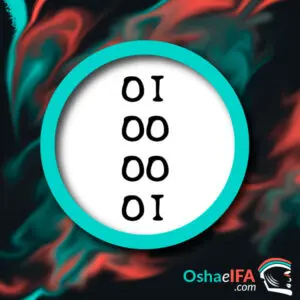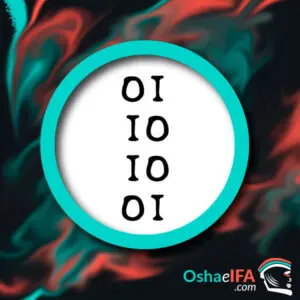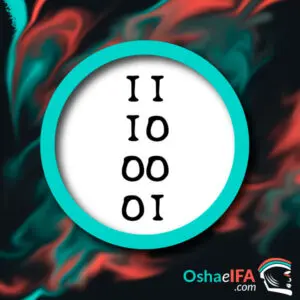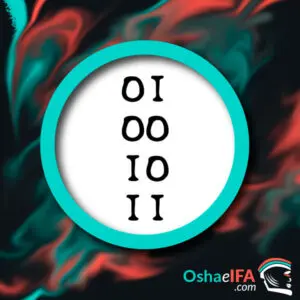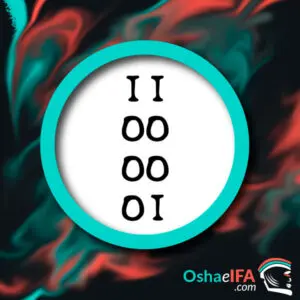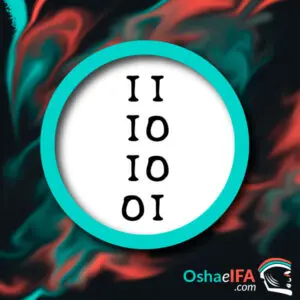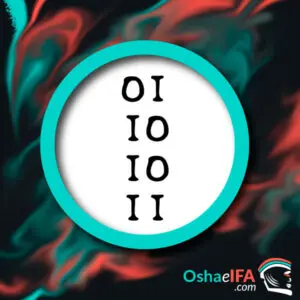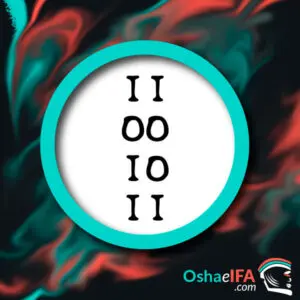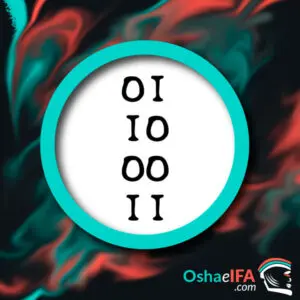Odi Ka: Meaning, Recommendations, Patakies and more

Odi ka is one of the most mysterious Ifa signs of the Ifa Corpus, here the spirituality of Tenta Orun is born and the one that the Iyawo must wear in white. This is Odu number 71 in the Lord's Order. Ifá advises that this person should offer sacrifice for a long life, orunmila It will help you defeat your enemies.
Other names of the Odi Ika:
Hate Ka.
In the odu Odi Ka is born:
- The presentation of the IYAWOS to the drum.
- Why do those who do Osha or Ifá wear white for a full year.
- The transformation of the thief.
- ODUDUWA, at the foot of the Ceiba.
- Tent-ORUN.
- Why the bat sleeps with its head down.
- Feed the 16 OLDER Odu.
- OKUMAMBO, the defense of SHANGO.
- The swearing in the children of OSHA-IFA in ORUN.
- For the first time the heads were begged to men.
- When you see this Odu, you have to go to the sea with a cane at 6 o'clock in the afternoon and beg OLOKUN.
You may also be interested in: All about the Odu Ika Di
The Oddun Odi Ika Speaks:
- YEMAYA saved her people from OSHUN's bad examples and misrule.
- ODI KA marks loss of reason.
- It is an Ifá of mask.
- Ifá is asking for food, her head, the Saints and her mother (if she is deceased).
- YEMAYA is drummed.
- This Odu predicts that it is destructive. so it cannot be put at the head of any ALAWO.
- When this Odu comes out in ATEFA, it is retired.
Ifá speaks of immoralities.
The Odi Ka Sign points out:
- Here: It is said that ODI KA was the King of mysteries.
- You always need a person to guide you.
- You cannot eat rabbit.
- ORISHAOKO cursed ODI KA.
Recommendations of the Odi Ka sign:
This Ifá sign represents the ODU ISALAYE of ODUDUWA.
ODI KA is the King of mysteries. As you can see it is represented by the bat, which is a mysterious animal.
The person governed by this Odu, will always need someone to guide him, so that he can become something in life.
The AWO ODI KA, the house was governed by a woman, who while taking care of the AWO, there is no problem and everything will go well, but due to lack of respect and considerations she will abandon it.
This Ifa sign speaks of problems with children and even has children whom she has not recognized and therefore do not have her last name.
There are children who can come out with defects, both physical and brain.
This Oddun explains that the person cannot indulge in drink, as he will become alcoholic and lose everything.
Because of Odi Ka you cannot eat rabbit (Ejoro), because here the rabbit became King of the hole (joro joro) and everyone even IKU (death) must respect it.
This Odu speaks MAFEREFUN YEMAYA, who saved his people from the bad examples and misrule of OSHUN.
Here, if the person is neglected, they become destitute.
Sayings of the Odu Odi Ka:
- He who applauds the acts of an evildoer is of his own ilk.
- To live in peace, it is more necessary to hide the merit than the defects.
- On earth there is no divine justice.
- The vampire ABITA, lies face down, his son the bat, lies face down, but if
- You lie on your stomach, your stomach will choke your neck.
- I am the King of mystery.
Odi Ika bans:
This is an Ifá of immoralities.
Here was born TENTE ORUN AND ODUDUWA.
This Odu (Odi Ika) talks about the bat and the powers that he obtained from ABITA AND TENTE ORUN, such as OLOFIN's curse of only going out at night, because during the day it affected him because he collided with his enemies.
The owner of this Odu will always be standing still and will always live among enemies, ODUDUWA AND OLOFIN can never miss to live.
The AWO who has this Ifá, will never be able to give ORISHAOKO to anyone, otherwise he will have to do many ceremonies, so that health does not reduce his money or losses.
By Odi Ka, if the person is careless, he reaches misery.
The reason why the bat sleeps with its head towards the ground was born, whether in caves, in houses or in the crowns of leafy trees.
In this Odu, OBATALA ORISHAYE was born, very little known in Cuba. Also this OBATALA speaks in BABA OTURA MEJI. It is an OBATALA woman.
When ODI KA went to bathe in the sea, he saw a head pop up to the surface and he caught it, and it was ODUDUWA. Then he heard another voice that said to him: Hey, don't leave me here, I'm with that one. And another head emerged, which was ODU's.
ODI KA was the only one who could see ODUDUWA AND ODU's head.
When ODI KA comes out at ATEFA, the AWO has to cook a lot of OSHIN-SHIN for ORUNMILA and the ALAWO has to be handed ODUDUWA on the run. Preferably you should leave the IGBODUN DE Ifá and receive it.
You may also be interested in: Odu of Ifa Ogunda Mass
Ifa says in the Odi Ka sign:
When Odi Ka appears in divination the person will be told that his life is not stabilized. You should make sacrifice to have a stable life.
When this Odu appears in the Igbodu, the person is destined to be offended and ostracized by all people. They shouldn't be overly concerned if you make the sacrifices.
In divination, you would entertain Esu because of an attempted gathering or grouping in which you will be involved.
If he is neglected, he will become destitute, he needs someone to guide him, to become something in life. He disrespects him and has no consideration for his wife; if she becomes his enemy, everything will go wrong for her.
Prayer of the Odu Odi Ika:
ODI KA OKOLOYU OPUA ADIFAFUN ORISAYE TINSHOMO AYALORUN OBA NIFA
TINSHOMO OLOFIN OBA ORISAYE ADIFAFUN EGUN OYOGBA ORUN MAFEREFUN
SHANGO ORISAYE OBAYE ADIFAFUN ODUDUWA.
Suggest:
OBA KERELE OBA KERELE
OYU KERELE OBA KERELE
EGUN KERELE OBA KERELE
ODUDUWA KERELE OBA KERELE.
Ebbo of the Odu Odi Ika:
INSHE OSANYIN.
An Indian rooster is given to OBATALA ORISHAYE, a jicotea and 2 quail to SHANGO (next to a royal palm at twelve o'clock, giving an account with OBI-OMI-TUTU) OKE will be given a white dove.
Take a bit of the rooster's crest and whiskers, OKE's pigeon heart, jicotea's head and SHANGO's quail heart and heads.
It also has 3 blades of shayo herb, a pod of pica pica, 6 strong sticks, guinea pepper, a piece of Magnet stone, a piece of ODU-ARA (Lightning stone), grass sacu sacu, Obí, Kolá, head and the heart of a bat, feathers of ringworm, sulfur.
You wonder if with this NATO.
You may also be interested in: Ifa Odi Meji sign
Meaning of the odu Odi Ika
This Odu warns of severe punishments for wrongdoing.
It warns that the person faces potential betrayal in business or personal secrets.
Here was born the presentation of the IYAWO to the drum and why they have to wear white for a whole year.
This is an Ifá of mask. The transformation of the thief is born.
Here you enter and exit the trap.
When this Odu comes out, Ifá is asking for food, they are given 2 black hens, the head is begged, food is given to OSHA and the mother if she is deceased.
This Odu also predicts accidents at home and on the street.
YEMAYA should be drummed.
This Odu is destructive. In a ceremony of consecration of an ALAWO, ODI KA must not mark his Odu on the head of the ALAWO, he must mark EJIOGBE OR OGBE TUA because ODI KA does not have a head, since those who give it to him are these two Odu. This Odu when it comes out in an ATEFA, it must be removed (cleared) and not written to the board again; when erasing it, you pray; because ODI KA does mark truly apprehension.
To AWO ODI KA, you have to be very careful in begging his head with snapper, because whoever does it has to do works so that he does not die within a year.
ODI KA was the first on earth to beg men for their heads. The first went to BABA EJIOGBE, the second OGBE TUA, the third to OGUNDA FUN and the fourth to OSALA FOBEYO.
The AWO ODI KA, the head is requested with a fresh fish, that has a large tongue and sea water. Later with that language an INSHE-OSANYIN is mounted.
Odu Odi Ka Ifa Code of Ethics:
On earth there is no divine justice.
Patakie of the sign of Ifa Odi Ka:
The ORUN and ORUNMILA pact.
OBATALA BABA ORISHAYE, had 16 small children who lived in a house that he had on the hill, he had a large mouse that was the one that fed them, but he was already tired of serving OBATALA and he went to ORUNMILA's house To look at himself and this Odu ODI KA came out, then, ORUNMILA marked him EBO, and told him that he had to do it if he wanted to get rid of the slavery of OBATALA. The mouse made the EBO and OBATALA could not use it anymore.
From that day on, the children of OBATALA began to starve, for that reason he was always afflicted. One day ORUN saw him and asked him what was wrong with him and OBATALA told him everything that was happening with his children. ORUN, upon seeing the opportunity that presented itself, told OBATALA: We are going to make a pact. And OBATALA asked him what the pact was and ORUN told him: You don't go out at night and I will bring everything for you and your children. OBATALA accepted.
But it turned out that Eshu, who wanted to take ORUN, went to OBATALA with 7 ears of white corn, to make him AWADO IÑA (toasted corn) and with this he cajoled him until he was convinced and took him to ORUNMILA's house, where he made him OSODE and gave him saw this Ifá. ORUNMILA begged his head and told him: For 8 days do not go out on the street during the day (because the pact with ORUN was for OBATALA to go out during the day with a suit and at night ORUN would go out with the same suit, so that everyone world believed it was OBATALA), but when ORUNMILA begged his head and told him not to come out, ORUN could not do anything, he realized that OBATALA was deceiving him and that everything was coming because of Eshu.
Then ORUN called IKU (death) and went out to the street together with FEFE IKU where he sang:
«AFEFE IKU MOWA CANVAS GBOGBO OMODE AFEFE IKU CANVAS»
They in retaliation tried to demolish OBATALA's house and seeing that they could not, they began to demolish the others, where OBATALA's children were going down the street and killed 15 of them for walking on the street and the other was very seriously ill.
Seeing this, OBATALA returned to ORUNMILA's house, who again saw the ODI ODI KA, where he made EBO and ordered him to put the snail and the trap on the shore of the beach, to catch ORUN.
When ORUN saw him, he ran to the sea, but there Eshu was waiting for him and took him, so ORUNMILA reduced him to obedience and the pact was made with ORUN and ORUNMILA, to be able to swear to all his children and OSHAS by the power of ODI KA, where this was because everything was started by the mouse in the world.
Odi Ika Ifa Traditional
I guess for Ikumakpayi's mother:
Idi-Eka was a popular Ayo player in the prime of his life. News reached heaven of his skill in the game and death sent him a message that she was going to play Ayo with him. The tradition was that anyone who was defeated by death in the game had to go to heaven. Idi-Eka waited for death for three years without it appearing.
After three years, death was on his quest, but Idi-Eka was too old for the game. He could no longer see seeds.
When death came, Idi-Eka called one of her sons named Ikumakpayi to play with her. Death conquered him, but his mother, who was an esoteric seer, had already perceived that her son was going to be defeated by death. Therefore she went to see Orúmila for a preemptive divination and was advised to give Esu a goat. She made the sacrifice.
After defeating Ikumakpayi, Death was preparing to go with him to heaven when Esu intervened to taunt her. She told him that she had come into the world to play Ayo's game with an old man, but that she ended up playing with a teenager. Esu provoked her by telling her that what pride would death have for having defeated and wanting to take a boy instead of a man? Death thanked such irony and in honor of the name of the young man who had given him immunity from death, he left alone and returned to heaven empty-handed.


